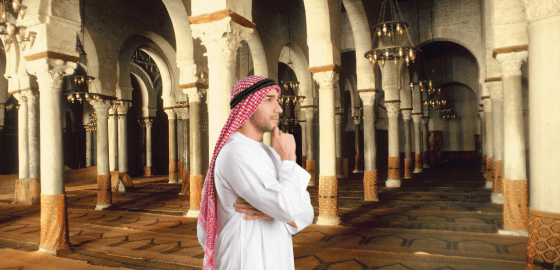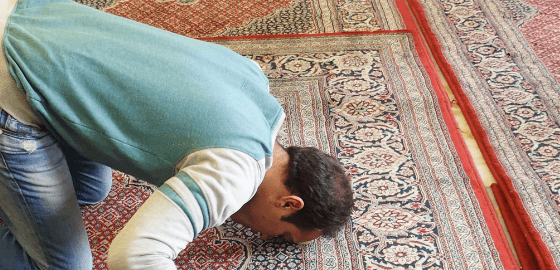What really differentiates Islamic Productivity from other theories of productivity? Definitions are something I always found fascinating. A word could mean three different things to three different people. The definition of productivity is a good example of this.
The materialist would see a day spent in theological discussions as wasted time and unproductive. Yet to the theologian, this is the most productive usage of his time. A businessman may fail to see the value of spending one’s time memorizing an ancient text in a foreign language. But for the Hafez, any time spent memorizing and revising the Quran is the most beautiful and productive usage of his time.
A clash of world views
Islamic ideas operate in a different paradigm from materialistic ideas. This paradigm of obedience to God and preparing for the Afterlife makes the Islamic definition of things very different from modern ideas. Words like success, productivity, time management, and destiny mean very different things to the believer.
Recently, I read some comments from people influenced by modern theories that got me thinking about this topic. One person commented that Muslims are unproductive in Ramadan because fasting causes them to perform poorly at work. Another commented that Muslim women who take care of their families are being unproductive because they are not out there working for money. It is very interesting that both these comments focused on the concept of productivity. This made me realize that our perspective on productivity is very different from other people.
Productivity: An Economic Concept
The standard definition of productivity in most dictionaries indicates the current worldview. Productivity is defined as “the effectiveness of productive effort, especially in industry, as measured in terms of the rate of output per unit of input” (Google) or “the quality, state, or fact of being able to generate, create, enhance, or bring forth goods and services.” (Dictionary.com)
These definitions limit productivity to the economic impact of a person’s actions. By such definitions, it is easy to understand why some people view taking care of one’s family or spending a week in a Masjid worshiping the Creator as unproductive. These tasks do not produce goods or services, or lead to the economic advancement of a community. Hence, they are viewed as unproductive by some segments of society.
As Muslims, however, we must be careful not to allow materialistic ideas to influence our understanding of things. A Muslim’s life does not revolve primarily around economic input and output. Work and wealth are simply tools to enhance the quality of life, and not the purpose of life itself. For the believer, there are things that are much deeper than one’s material status; things like piety, spirituality, family, and the Afterlife.
Productivity: A Spiritual Concept
Islam teaches us that this world is a testing ground for humanity. We are constantly being tested in a variety of ways. The primary test is to find the true religion of God, accept it and try one’s best to follow it. Obedience and worship of the Creator is the purpose of life for humanity and that takes precedence over everything else, including work and accumulating wealth.
In light of this, Muslims should not cling to materialistic definitions of productivity. Our goals are different and so our definitions should differ accordingly. For the believer, a life spent in pursuit of wealth and status, at the expense of the Afterlife, is a life wasted, an unproductive waste of existence. The deeds that contribute to our Afterlife, and especially the ones that keep on producing more rewards, these are the truly productive acts.
The Prophet (peace be upon him) said, “When the human being dies, his deeds end except for three: ongoing charity, beneficial knowledge, or a righteous child who prays for him.”
Ṣaḥīḥ Muslim 1631
This narration gives us some insight into the Islamic paradigm of productivity. A believer should strive to build up his or her streams of continuous good deeds i.e. deeds that continue to benefit long after one’s death. Based on this narration, a life spent in raising a righteous child, seeking beneficial knowledge then spreading it, and a life spent in charity, are all truly productive lives.
“Wealth and children are the adornments of the present life. But the things that last, the virtuous deeds, are better with your Lord for reward, and better for hope.”
Quran 18:46
This verse of the Quran conveys the same message. While wealth and children enhance the quality of life, true productivity lies in producing virtuous deeds that last, like raising righteous children or spending a large portion of one’s wealth in charity. The Quran and Sunnah are both full of reminders that the believer should prioritize the Afterlife. This prioritization affects our definition of productivity.
Conclusion: A Spiritual Definition
The life of a Muslim revolves primarily around the worship of God, and investing in the Afterlife. This does not mean that a Muslim does not work for this world. Rather our religion encourages hard work, and frowns upon laziness. But everything has its place, and the Afterlife is a greater priority over this world.
A Muslim works hard in every aspect of his or her life but does so in proportion. More time and energy is spent in serving the Creator and building one’s Afterlife. Yet enough time is spent in earning income to provide a blessed Halal life for one’s family. The believer will work hard at his job but will take a break when it is time to pray. A Muslim will try his best to earn well, but will not compromise on Halal earnings, and will dedicate a portion of his earnings to charity. The believer will make time daily to worship the Creator, spend time with the family, contribute to society, and earn some income while prioritizing the Afterlife over this world.
A life spent investing the Afterlife is not unproductive. It is a blessed spiritual existence full of Barakah (Blessing) and Sakina (Inner Peace). The Muslim who chose seclusion in the Mosque while fasting during the last ten days of Ramadan is truly productive in the sight of God. The Muslim woman who invested her youth in raising her children to be righteous beautiful people is truly productive in the sight of God. The Muslim teenager who spends her evenings memorizing the Quran is truly productive in the sight of God. Never allow a materialistic person to convince you otherwise.
If you found this article beneficial, check out our full range of ebooks here.






